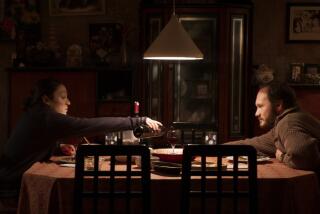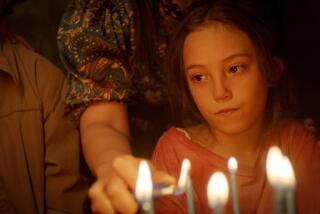Cannes 2014: Nuri Bilge Ceylan’s slow-burn Palme d’Or, and career
For more than a decade, the Turkish director Nuri Bilge Ceylan has been reliably bringing a movie to the Cannes Film Festival every time he had a new one, starting with the odd-couple class drama “Distant” in 2002 and continuing with new works “Climates,” “Three Monkeys” and “Once Upon a Time in Anatolia”, at intervals of about every three years. He won at least one prize each time out.
This year Ceylan premiered his new movie, the marital drama “Winter Sleep,” on the Croisette. And on Saturday he reached a career pinnacle, winning the Palme d’Or, Cannes and global cinema’s highest honor.
Given Ceylan’s deliberately paced Cannes ascent, it is fitting that he won the biggest prize of his life with “Sleep”--itself a slow-burn story that revels in the details, and then some, over its 3¼-hour running time.
“It’s not really okay now to do a movie this long,” he said. “Maybe 20 years ago it was okay. People today like to live fast.” He paused. “I like to go slower.”
Ceylan, 55, has a sweat shirt pulled up on a windy day as he talks at the beachside restaurant area of the Turkish Pavilion, the country’s headquarters in Cannes. It is a week before the director will learn his film’s epic length is a selling point, or at least no obstacle, to the Jane Campion-led jury that will vote on the Palme. Still he is unapologetic, saying he believes people will stay with these characters -- particularly protagonist Aydin (Haluk Bilginer), an actor-turned-hotelier and newspaper columnist -- even through the dialogue scenes that can flatten and undulate many times over before they’re done.
Besides, Ceylan says, flashing a smile, impatient viewers should consider themselves lucky. “This is the shortened version. The original was 4½ hours,” he said.
Telling personal stories -- often about existential characters and dilemmas -- in an exotic setting has been Ceylan’s calling card since he came on the scene (his first film was “Small Town,” which received accolades at the Berlinale when it premiered there in 1998). “Winter Sleep” offers maybe the most ambitious example yet of this admixture.
After an opening scene that lays out, in the movie’s picturesque Cappadocia town, class tensions between the wealthy landowning stratum (of which the middle-aged Aydin is a part) and the poor residents who see little but hopelessness and harassment from their unofficial masters, the movie shifts into a lower gear. Aydin soon gets into a series of extended one-on-one conversations with his younger wife Nihal (Melisa Sozen).and divorcee sister Necla (Demet Akbag) over their respective life choices and one’s purpose on this earth generally.
Aydin has an earnest, righteous quality, but it is a peculiar brand of piety, brushed with arrogance as he admonishes Nihal for, of all things, her charity work. As these conversation unfold, one gains insight into Ceylan’s view on justice and life’s purpose even as small character details, not all of them savory, emerge.
Much of the movie continues in this fashion -- the sprawling Turkish countryside setting belies the film’s chamber-piece essence -- before a final-hour turn to Istanbul, where the plot quickens its pace.
“You had to include those conversations before sending Aydin to Istanbul,” Ceylan said, offering an indirect explanation for the digressive, conversational nature of his film and a rebuttal to those who in these past few days have been pressing him on it.
How much Aydin can or should be identify with is a question at the heart of the piece, since while he makes some defensible points, he also has a peremptory air that keeps him at arm’s length from our sympathy and makes us ask questions about both his motives and our own.
“I’m interested in the timeless. This is a story about the human soul. When you think about it, we know nothing about that,” said the director, who wrote the film with his wife and former acting collaborator Ebru Ceylan, a professional union that may help explain the movie’s preoccupations with marriage and partnership.
Ceylan has a ruminative style of speaking, filled with pauses, that is reminiscent of some of his characters. He said this film came out of a tension he felt between the way he and his peers live his life compared with working-class people, and a kind of crisis of conscience that came with that realization.
“We intellectuals like thinking about life more than living it.” he said. “It leaves you with a guilty conscience sometimes. Other people are living it.”
Indeed, also central in the movie (which does not yet have distribution in the U.S.) is the difficult position everyday people find themselves when economic prospects are bleak and class and religious tensions are high, as they are in modern Turkey, the personal made more dramatic by the political. It is no accident that Ceylan tossed a nod in his Palme acceptance speech to “the young people in Turkey and those who lost their lives in the last year,” a reference to the economic and religious tensions the country has faced of late. The filmmaker’s movies may not be overtly topical, but topicality is never far from his mind.
Turkey had not previously been a global-cinema power, but Ceylan has begun to change that. And if recent movies—including “Monkeys” and “Anatolia”-- have had more of a genre dimension, this film is more sweeping, he said, simply because a life, longer and more fully lived, leads to tougher questions and grander perspectives.
“I never wanted to make a film about one thing. I wanted it to be about life,” he said. “So I felt free to put everything in there. Other films [of mine] maybe are more narrow. This is more divergent.”
That divergence can take time to develop. but as Ceylan learned Saturday, if it’s moving in the right direction it will one day be rewarded.
More to Read
Only good movies
Get the Indie Focus newsletter, Mark Olsen's weekly guide to the world of cinema.
You may occasionally receive promotional content from the Los Angeles Times.







